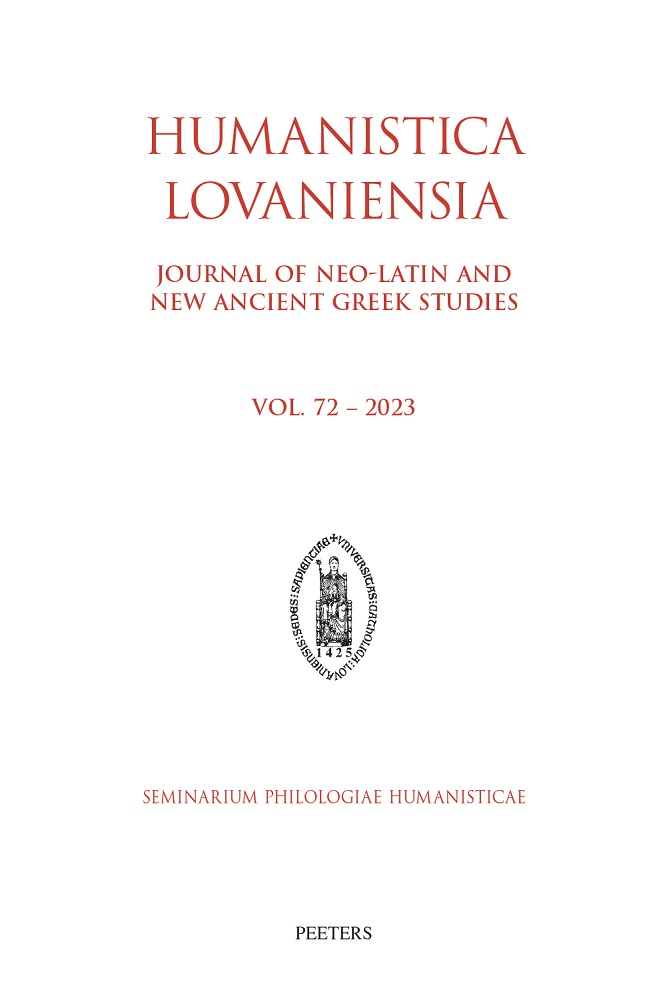Kristi Viiding „Lipsius, iam Lapsius? Justus Lipsius im frühneuzeitlichen Est-, Liv- und Kurland“

Titel: Lipsius, iam Lapsius? Justus Lipsius im frühneuzeitlichen Est-, Liv- und Kurland
Autor: VIIDING, Kristi
Zeitschrift: Humanistica Lovaniensia
Band: 72 Date: 2023
Seiten: 189-210
DOI: 10.2143/HLO.72.0.3292718
Am Ende des 16. Jahrhunderts erstreckte sich der Korrespondentenkreis von Justus Lipsius in Nordosteuropa bis ins nürdliche Baltikum, damals Estland, Livland und Kurland. Zwar erwähnt die bisherige Forschung es ab und zu und bestätigt die Kenntnis des flamischen Humanisten im damaligen Nordbaltikum, doch sind die einzelnen Belege aus historischen Grunden zwischen vier – polnischen, schwedischen, deutschbaltischen und niederländischen – Forschungstraditionen zersplittert. Bekanntlich verlor Altlivland 1561 die Selbständigkeit und blieb bis 1710 zwischen dem vorwiegend katholischen Polen-Litauen (Liv- und Kurland), dem lutherischen Schweden (Estland) und Dänemark (Ostseeinseln Estlands) geteilt. Die häufigen politischen und religiösen Veränderungen (die lange Reformation in den landlichen Gegenden Estlands, die permanente Russengefahr an der Ostgrenze) wirkten sowohl auf der institutionellen als auch auf der privaten Ebene, so dass in den frühneuzeitlichen Generationen fast alle ihr Glaubensbekenntnis und viele durch Exil auch ihre Heimat wechselten. Diese teilweise mit der in den Niederländen vergleichbare Situation, aber auch die seit der Hansezeit vorhandenen Handels- und Kulturbeziehungen zwischen beiden Regionen inspirieren die Lipsius-Rezeption im Nordbaltikum systematisch zu überprüfen und ihre Schwerpunkte zu definieren.
This article deals with the relations between the early modern Low Countries and Livland in the years 1590-1700, based on how people related to the famous Flemish humanist, philosopher, and philologist Justus Lipsius (1547-1606) through his books and ideas. The attitude towards Lipsius in early modern Estland and Livland ranged from flattery and recognition to contempt and warnings in the spirit of orthodox Protestantism. Personal contacts with Lipsius were rare and only in the form of correspondence between 1591 and 1606, not face-to-face meetings. Contacts with him occurred mainly in Livland and Courland, which remained under the influence of the Polish-Lithuanian Commonwealth. Such contacts were partly formed during the ‘Niederlandisierung’ that took place in the book culture of this region. The decisive preparatory step for this process was the invitation of the first Livonian printer Claes Mollin from Antwerp to Riga (1588) and the exclusive privilege to import books to Riga in 1592. The main way to learn about Lipsius’ ideas was through his books. Private libraries were the first to acquire works by Lipsius. It was not until the middle of the 17th century that the libraries of academic institutions also began acquiring them. His Letters, Six Books on Politics, and Two Books on Constancy were his canonical books, which were widely read and used in teaching activities, including in making entries in alba amicorum and florilegia. Very few Livonians, on the other hand, were interested in his antiquarian, philological and other philosophical works on antiquity. The Latin idiom that Lipsius developed and promoted (Lipsianism) was only exceptionally cultivated in Livland. Lipsius did not inspire anyone in Livland to publish and translate his works.